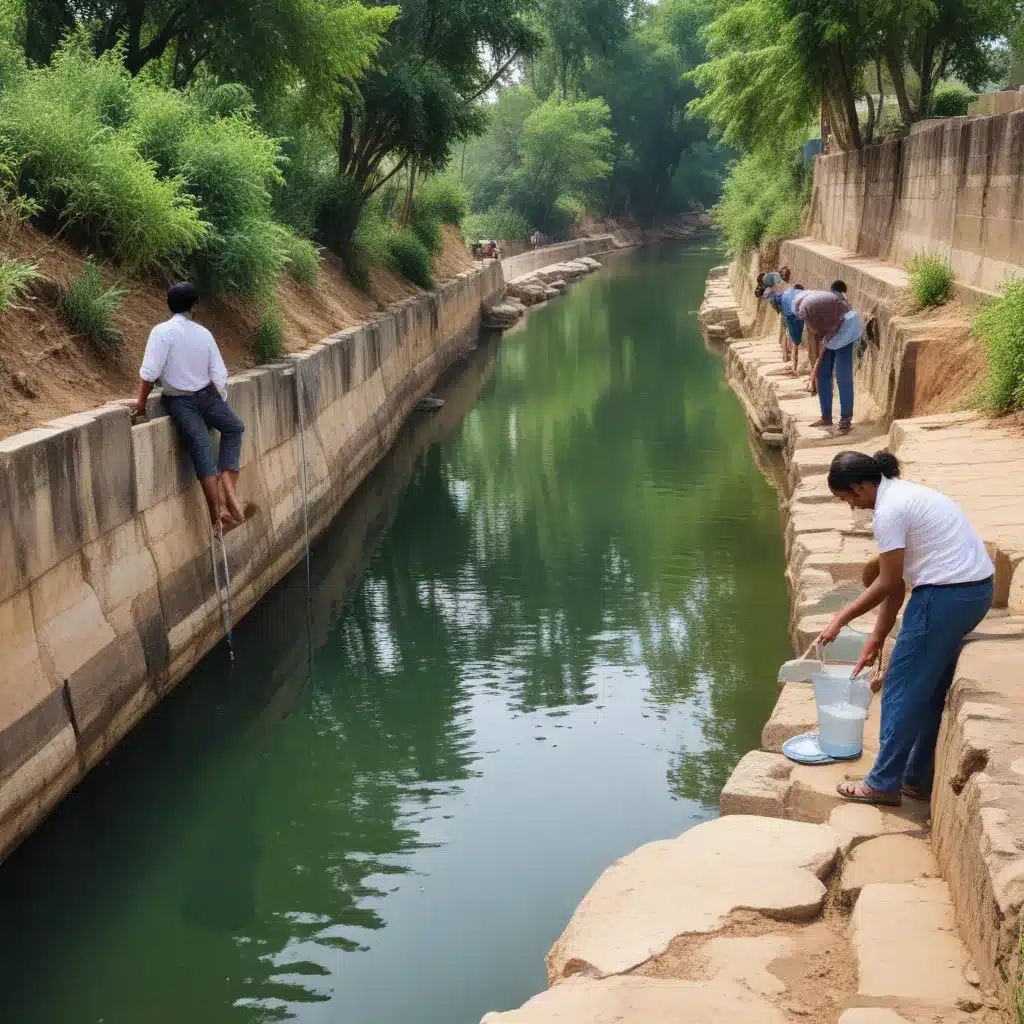
Addressing Hyderabad’s Water Quality Challenges through Collaborative Action
As a seasoned expert in water and sanitation services, community engagement, and advocacy, I have witnessed firsthand the critical importance of effective governance in ensuring clean and accessible water for all. In the bustling city of Hyderabad, India, the need for robust water quality monitoring and enforcement has become increasingly pressing, given the city’s rapid urbanization and industrialization.
Hyderabad, the capital of Telangana state, is a thriving metropolitan area known for its vibrant technology and pharmaceutical sectors. However, this growth has also brought about significant environmental challenges, particularly in the realm of water management. The city’s water bodies, including the iconic Hussain Sagar Lake, have become increasingly polluted, posing serious risks to public health and the ecosystem.
Inadequate Water Quality Monitoring and Enforcement
One of the primary contributors to Hyderabad’s water quality woes is the lack of comprehensive and consistent monitoring and enforcement efforts. While India has a well-developed legal framework for environmental protection, including the Water (Prevention and Control of Pollution) Act of 1974, the implementation and enforcement of these laws have been inconsistent across the country.
In the case of Hyderabad, the existing water quality monitoring systems are often fragmented, with multiple government agencies and authorities responsible for different aspects of water management. This fragmentation has led to gaps in data collection, analysis, and decision-making, making it challenging to identify and address the root causes of water pollution.
Moreover, the enforcement of water quality standards has been weak, with industries and municipalities often sidestepping regulations or facing lax penalties for non-compliance. This lack of accountability has perpetuated a cycle of pollution, with little incentive for stakeholders to invest in sustainable water management practices.
The Need for Improved Governance and Collaboration
To tackle Hyderabad’s water quality challenges, a comprehensive and collaborative approach to governance is essential. This approach should involve the active participation of various stakeholders, including government agencies, industry leaders, civil society organizations, and community representatives.
One key aspect of this improved governance model is the strengthening of water quality monitoring and enforcement mechanisms. This can be achieved through the following measures:
-
Integrated Water Quality Monitoring System: The establishment of a centralized, real-time water quality monitoring system that collates data from various sources, including government agencies, research institutions, and community-led initiatives. This integrated system would provide a comprehensive view of the city’s water quality status, enabling more informed decision-making and targeted interventions.
-
Capacity Building and Coordination: Investing in the training and capacity-building of government officials, particularly in the State Pollution Control Board and local authorities, to enhance their understanding of water quality regulations, monitoring techniques, and enforcement strategies. Additionally, fostering better coordination between these agencies to streamline decision-making and implementation processes.
-
Transparent and Accountable Enforcement: Strengthening the enforcement of water quality standards by introducing more stringent penalties for non-compliance, including the possibility of plant shutdowns or environmental restoration orders. This should be coupled with increased transparency in the enforcement process, allowing for public scrutiny and accountability.
-
Collaborative Multi-Stakeholder Partnerships: Encouraging the formation of multi-stakeholder partnerships between government, industry, and civil society organizations to develop and implement innovative solutions for water quality management. This could include the establishment of public-private partnerships for the development of advanced water treatment technologies or the implementation of community-based water monitoring programs.
-
Community Engagement and Awareness: Empowering local communities to actively participate in water quality monitoring and advocacy efforts. This can be achieved through educational campaigns, citizen science initiatives, and the establishment of community-based water quality monitoring networks. By engaging citizens, the governance process becomes more inclusive and responsive to the needs of the people.
Leveraging Technology and Innovative Solutions
Advancements in water quality monitoring and enforcement can be further enhanced through the adoption of innovative technologies and solutions. These include:
-
Remote Sensing and GIS: Utilizing satellite imagery and geographic information systems (GIS) to map and monitor water bodies, identify pollution hotspots, and track water quality trends over time.
-
Sensor Networks and IoT: Deploying a network of interconnected water quality sensors that can transmit real-time data to a centralized monitoring system, enabling rapid identification and response to water quality incidents.
-
Data Analytics and Modeling: Applying advanced data analytics and predictive modeling techniques to the water quality data, allowing for the identification of pollution sources, the development of targeted mitigation strategies, and the simulation of the impact of various interventions.
-
Wastewater Treatment and Reuse: Promoting the adoption of advanced wastewater treatment technologies, such as membrane bioreactors and reverse osmosis, to enable the safe reuse of treated water for industrial and municipal applications, reducing the burden on freshwater resources.
-
Nature-Based Solutions: Exploring the potential of nature-based solutions, such as constructed wetlands and ecosystem restoration, to enhance water purification and groundwater recharge, while also providing valuable ecosystem services.
Conclusion: A Collaborative Approach for Sustainable Water Management
Addressing Hyderabad’s water quality challenges requires a multifaceted approach that combines improved governance, collaborative partnerships, and the strategic deployment of innovative technologies. By strengthening water quality monitoring and enforcement mechanisms, empowering communities, and fostering cross-sectoral collaboration, we can work towards a future where Hyderabad’s water resources are clean, accessible, and sustainably managed.
The Joint Action for Water initiative stands ready to support this endeavor, leveraging its expertise and network to facilitate knowledge sharing, capacity building, and the implementation of best practices. Together, we can transform Hyderabad’s water landscape, ensuring a healthier and more resilient city for all.

